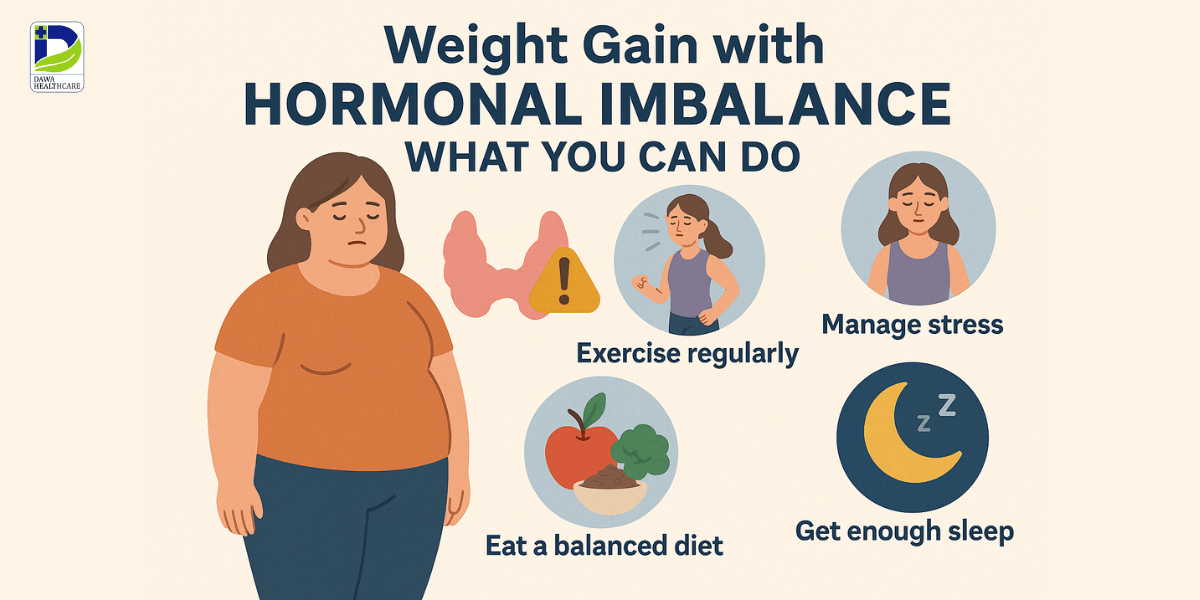
Weight Gain with Hormonal Imbalance: What You Can Do
If you’re gaining weight despite eating right, working out, and staying active, your hormones could be to blame. Many women—especially in their teens, 20s, and 30s—struggle with unexplained weight gain that seems immune to diet and exercise. The culprit? A hormonal imbalance.
In Pakistan, conditions like PCOS, thyroid disorders, insulin resistance, and stress-related hormone imbalances are increasingly common, yet often misunderstood or undiagnosed. Hormonal fluctuations don’t just affect your mood or periods—they play a huge role in your metabolism, fat storage, and appetite control.
In this blog, we’ll break down the main hormones linked to weight gain, the warning signs to look out for, and most importantly, what you can do to regain control.
How Hormones Affect Weight![]()

Hormones are chemical messengers that control everything from hunger and sleep to fat burning and energy levels. When they’re out of balance, even slightly, they can:
-
Slow down metabolism
-
Cause food cravings and overeating
-
Promote belly fat storage
-
Prevent fat breakdown
-
Make it harder to lose weight—even with effort
Common Hormonal Imbalances That Cause Weight Gain
1. Insulin Resistance
-
What it is: When cells stop responding to insulin, your body stores more glucose as fat—mostly around the belly.
-
Common in: PCOS, pre-diabetes, type 2 diabetes.
-
Warning signs: Belly fat, fatigue after meals, sugar cravings, dark skin patches on the neck or underarms.
2. Thyroid Imbalance (Hypothyroidism)
-
What it is: An underactive thyroid slows your metabolism, leading to weight gain, constipation, and fatigue.
-
Common in: Women aged 20–40, often genetic.
-
Warning signs: Weight gain, cold sensitivity, dry skin, hair thinning, sluggishness.
3. Cortisol (Stress Hormone)
-
What it is: Chronic stress raises cortisol levels, which triggers fat storage and increases hunger—especially for carbs and sweets.
-
Common in: High-stress lifestyles, poor sleep, irregular routines.
-
Warning signs: Fatigue, belly fat, late-night snacking, mood swings.
4. Estrogen Dominance
-
What it is: When estrogen levels are too high compared to progesterone, it promotes fat gain—especially in hips and thighs.
-
Common in: Women with PCOS, perimenopause, or hormone therapy.
-
Warning signs: Irregular periods, bloating, PMS, breast tenderness, stubborn weight.
5. Testosterone Imbalance (in Women)
-
What it is: High testosterone can increase visceral fat and cause muscle loss.
-
Common in: PCOS and adrenal disorders.
-
Warning signs: Acne, excess facial/body hair, irregular cycles, weight gain.
How to Tell If Your Hormones Are Off
If your weight gain is sudden, unexplained, or resistant to change, it’s worth checking your hormones. Ask your doctor about:
-
Fasting insulin and glucose levels
-
Thyroid function tests (TSH, T3, T4)
-
Testosterone, DHEAS, and estrogen levels
-
Ultrasound for PCOS
-
Cortisol (if under constant stress or fatigue)
What You Can Do About Hormonal Weight Gain
1. Fix Your Diet — It Starts with Food
The right food choices can help restore balance and reduce fat-promoting hormones.
-
Cut back on sugar and refined carbs
Avoid white bread, rice, sugary snacks, and sweetened drinks—they spike insulin and cortisol. -
Eat more fiber and healthy fats
Include vegetables, chia seeds, nuts, avocados, and olive oil to balance hormones and stay full. -
Prioritize protein
Eggs, chicken, lentils, and Greek yogurt help build muscle, regulate appetite, and burn fat. -
Stay hydrated
Water supports metabolism and flushes toxins that can disrupt hormones.
Tip: Avoid skipping meals or fad diets—they only worsen hormonal imbalance.
2. Move with Purpose
Exercise doesn’t just burn calories—it improves insulin sensitivity, lowers stress hormones, and boosts metabolism.
-
Aim for at least 30–45 minutes of exercise, 5 days a week
-
Combine cardio (like walking or swimming) with strength training
-
Yoga and pilates help reduce cortisol and improve hormonal balance
Even walking after meals for 15–20 minutes can improve insulin and digestion.
3. Manage Stress
Long-term stress keeps cortisol high, which encourages weight gain—especially around the midsection.
-
Try deep breathing, journaling, prayer, or short walks to unwind
-
Limit social media and blue light before bed
-
Build a consistent routine with breaks, sleep, and downtime
Sleep is also critical—hormones like leptin (hunger control) and ghrelin (craving hormone) go haywire when you’re sleep-deprived.
4. Supportive Medications (Only If Needed)
If lifestyle changes aren’t enough, your doctor may suggest medications depending on the hormonal issue:
-
Metformin
Improves insulin sensitivity and supports weight loss in insulin-resistant individuals. -
Levothyroxine (for hypothyroidism)
Restores thyroid hormone levels and boosts metabolism. -
Anti-androgens (for PCOS-related testosterone issues)
Helps reduce hair growth, acne, and weight gain. -
Birth control pills (for estrogen/progesterone balance)
Regulate cycles and reduce symptoms like bloating and weight retention.
Note: Never self-medicate. Always consult a doctor before using any hormonal therapy.
Get Tested, Treated & Guided – With Dawa Healthcare Pharmacy
At Dawa Healthcare Pharmacy, a trusted pharmacy in Karachi, we understand how confusing and frustrating hormonal weight gain can be. That’s why our team of qualified pharmacists is here to:
-
Help you understand your medication and how to use it
-
Recommend lab testing centers for hormone evaluations
-
Provide authentic, doctor-recommended brands
-
Support your wellness journey with vitamins, supplements, and diet tips
All medicines are dispensed only on valid prescriptions, ensuring your safety and long-term health.
Whether you’re managing PCOS, hypothyroidism, or insulin resistance, you’re not alone. Let Dawa Healthcare be your reliable guide—offering same-day delivery, affordable options, and professional support at every step.
